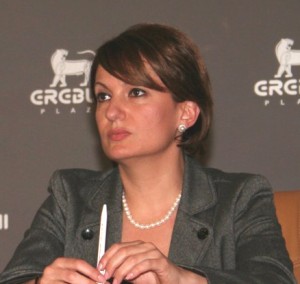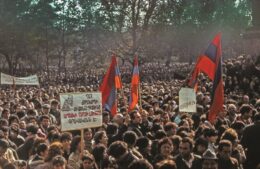Celebrations and Expectations
- (0)
BY MARIA TITIZIAN
This past weekend was celebratory in the country. The Armenian national football team beat Bulgaria on home turf, finally breaking a streak of losses at home. Young and old danced in the streets, strangers congratulated one another and the tricolor was draped on everything from people to cars. Yerevan turned 2795 years old marking it as one of the oldest continually inhabited settlements in the world; Etchmiadzin, Armenia’s spiritual center marked the 2698th year of its establishment and Gyumri (or Kumayri) Armenia’s second largest city whose roots can be traced to the 8th century BC was selected as the cultural city for the CIS in 2013.
A legacy of a rich history is certainly something to celebrate and be proud of and while this comes with a monumental burden it also presents endless opportunities. For many of us who were born and raised in foreign lands at a time when Western Armenia was occupied and Eastern Armenia was within the iron grip of the Soviet Union, being Armenian meant something. It meant not only retaining that heritage but also struggling for the liberation of an elusive homeland that had been forgotten in the dusty pages of history books. It meant keeping memories and traditions alive in a world that didn’t always understand us. It meant collective action and an unbreakable sense of community. It also meant working harder, being better, striving for greater heights.
When I recall those formative years growing up in North America, it seemed natural that we held commemorations, organized cultural and sporting events, staged protests and rallies every April 24, celebrated mass on Sundays and built schools and community centers to preserve our language and history.
In the absence of a homeland, and even with all the absurd in-fighting between the traditional political parties that claimed ownership of the Diaspora and its institutions, it was a game, the rules of which we determined and understood.
With independence that safe, familiar bubble burst and we were left unsure of what our role was in the Diaspora vis-à-vis the Republic of Armenia. Events in the homeland just before and after independence were developing so quickly that we didn’t have time to reframe what that new role was to be. Twenty two years on, we are still struggling to realign and determine a new conceptual framework.
If we could, in general, agree on the premise that a strong, secure and viable homeland is necessary not only for its own survival but for the long-term survival of the Diaspora, then we need to articulate and execute new ways of working and building structures and institutions.
In the chaos of nation-building, we have to be able to differentiate between the ruling regime of the day and the very concept of statehood – this regime isn’t going to last forever. We should not therefore limit our engagement with the homeland just because we feel that the current regime is undermining Armenia’s potential.
Armenia should be the axis around which contemporary Armenian identity is cultivated – how we structure and define that identity will determine how successful we are at sustaining this ancient nation.
The homeland must be the fountain that nourishes the needs of Armenians dispersed throughout the world – art, language, culture cannot thrive and develop without connection to the source of its inspirations.
The full potential of the Diaspora must be utilized and its efforts geared toward the homeland’s empowerment – a weak and fledgling nation cannot support or nurture its dispersed children, nor can it inspire or sustain them.
Strengthening the bonds of individual Armenians and communities with Armenia has to be an ongoing effort. Contributing to the empowerment and sustainability of Armenia must not be seen solely as a responsibility or burden but an opportunity to be part of its potential.
Celebrations, while they may instill a sense of pride and belonging, entail expectations and those expectations can be fulfilled only if and when we determine what we want as a nation. I hope one day we begin to see the homeland as central to our continued survival, as the fountain of inspiration, as a place that needs the cumulative abilities of all of its children, as a place where we belong.



















